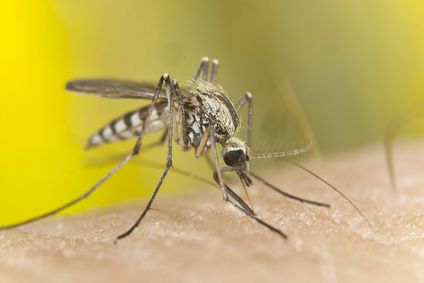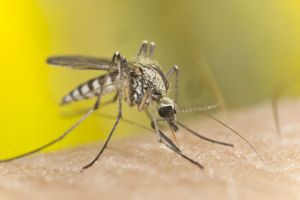
Move over West Nile – there’s a new virus potentially headed towards the United States, one that can cause crippling joint pain. While it is not usually fatal, chikungunya fever is definitely something you want to avoid.
In the southeastern African Makonde language, “chikungunya” means “that which bends up.” The primary characteristic of this virus, which is transmitted by mosquito bites, is people doubling over with the severe onset of pain in the joints. It can also cause high fever, headaches and rashes. Symptoms usually last approximately one week, however, in some cases joint pain may persist for longer.
In the Western world, the first case of chikungunya fever was documented last October on Saint Martin Island in the Caribbean. To this day, more than 1,000 cases have been documented across the Caribbean islands.
According to US Centers for Disease Control and Prevention (CDC) medical epidemiologist Mark Fischer, “I think it’s very likely that this virus will further spread throughout the Caribbean or the Americas… this will move from country to country and could basically establish itself and become endemic in this part of the world.” It is thought that the most likely way that this disease could come to the mainland is via travellers between the continental US and the islands.
This knowledge may prompt you to be increasingly careful about mosquito bites. However, chemically-laden insect repellants are not a health-conscious answer. The active ingredient found in a great number of bug sprays is DEET (N,N,-diethyl-meta-toluamide).
According to the National Institutes of Health (NIH), frequent, long-term use of DEET may lead to burning, blistering or permanent scarring of the skin. It may also lead to insomnia and changes in mood with long-term use, and could cause seizures in children.
These effects are just from being applied to the skin – DEET can be fatal if swallowed. The Environmental Protection Agency (EPA) recommends washing DEET-exposed skin with soap and water after coming back indoors.
If it was a safe product to use, why would it need to be washed off immediately? DEET can also cause harm to wildlife and aquatic life, as both the manufacturing process and disposal of DEET products can leach into water supplies.
Aside from DEET, the NIH also states that bug sprays containing pyrethrins, which are made from processed chrysanthemum derivatives, can lead to breathing trouble if large enough amounts are inhaled.
Luckily, there are a wide variety of natural solutions for repelling mosquitoes, which do not involve potentially damaging chemical compounds. One simple (and yummy) solution is adding fresh garlic to your meals.
Mosquitoes have been found to be dissuaded from biting the skin of individuals who regularly eat garlic. Besides keeping the bugs at bay, eating garlic offers a wide variety of health benefits.
Certain essential oils, especially those in the mint family including catnip, peppermint and spearmint, can help repel insects such as mosquitoes. Other essential oils that can work for this purpose include citronella, neem, lavender, black pepper and tea tree oils.
 You can dilute these oils, individually or in combination, with organic, extra-virgin coconut oil (approximately one part essential oil to three parts coconut oil) before stepping outside.
You can dilute these oils, individually or in combination, with organic, extra-virgin coconut oil (approximately one part essential oil to three parts coconut oil) before stepping outside.
If you are trekking through or camping in woody areas, wearing long sleeves and long pants is recommended, as the mosquitoes often lurk in larger numbers among the trees. If you are relaxing in your backyard or on a campsite, lighting a few citronella candles near where you are stationed is a time-tested way to keep those pesky mosquitoes away.
-The Alternative Daily
Sources:
http://www.scientificamerican.com/article/mosquitoes-carry-yet-another-tropical-disease-toward-the-us/?&WT.mc_id=SA_DD_20140206
http://www.mercola.com/article/pesticides/deet.htm
http://www.epa.gov/pesticides/factsheets/chemicals/deet.htm
http://www.nlm.nih.gov/medlineplus/ency/article/002763.htm
http://www.care2.com/greenliving/8-natural-mosquito-repellents.html
http://wellnessmama.com/2565/homemade-natural-bug-spray-recipes-that-work
http://www.thealternativedaily.com/garlic-the-superfood-you-dont-want-to-overlook

